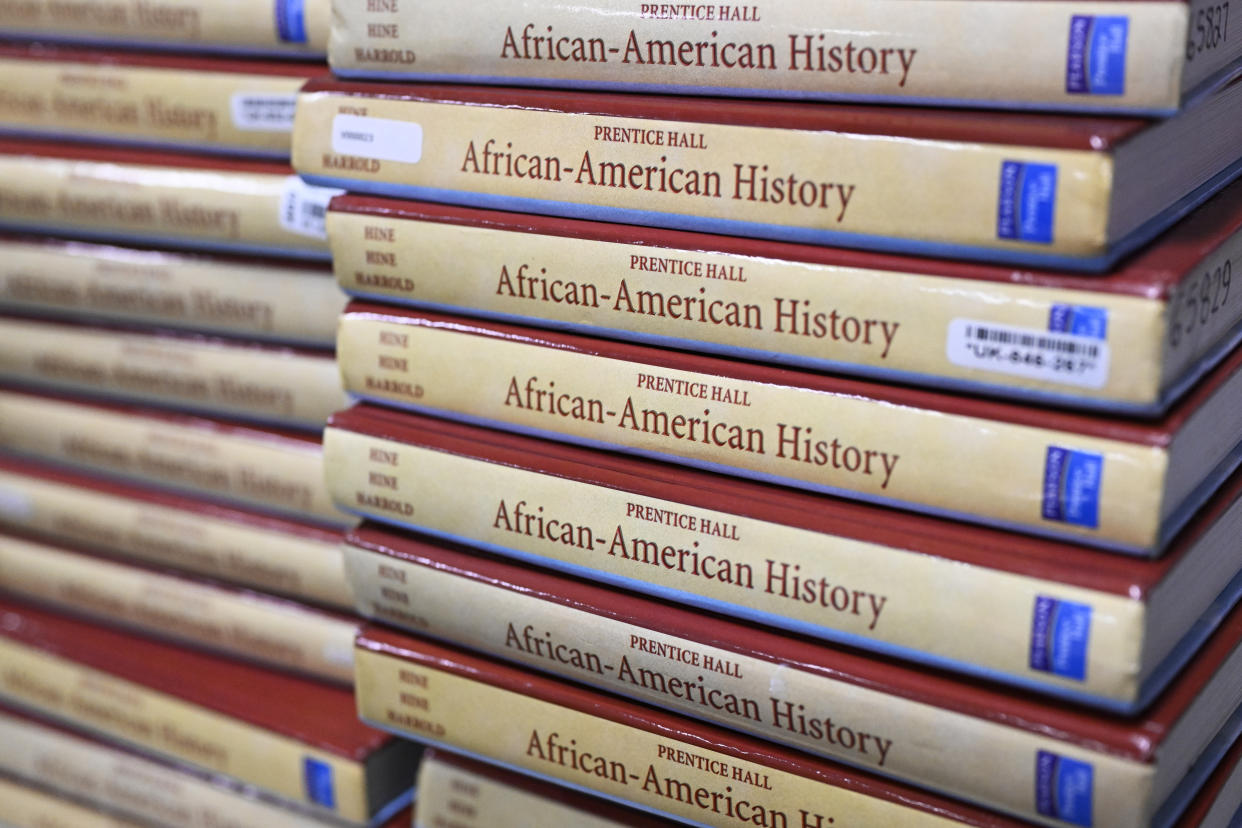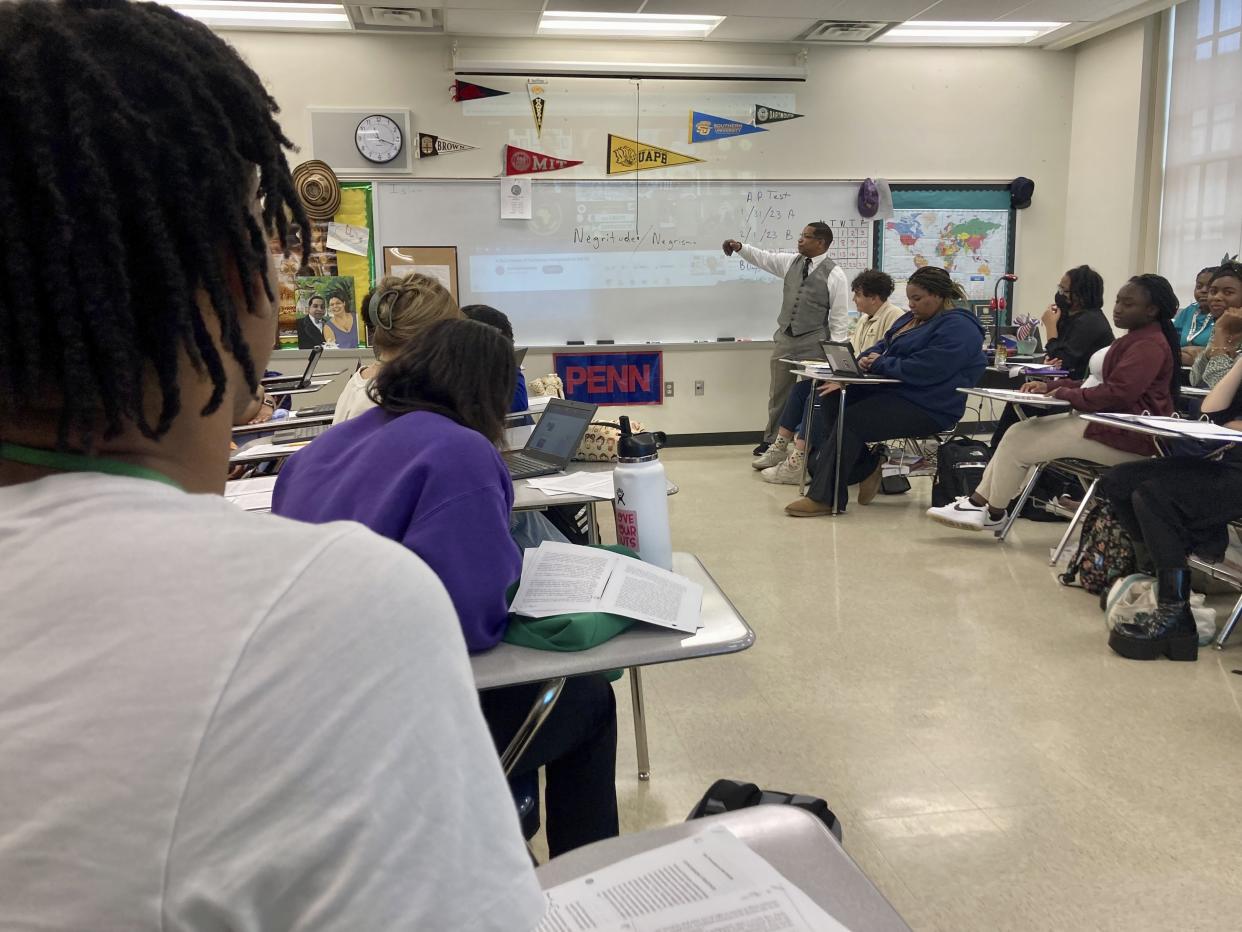ANDREW ROMANO
A new Yahoo News/YouGov poll shows that white Americans are just as likely to favor (40%) as to oppose (41%) a ban on teaching Advanced Placement courses in African American studies in public schools — the same sort of ban that Republican Gov. Ron DeSantis recently threatened to implement in Florida, unleashing a storm of national controversy.
In contrast, Black Americans (65% oppose, 20% favor) and Democrats (70% oppose, 19% favor) are far more resistant to a DeSantis-style ban. Yet because white Americans outnumber Americans of color — and because a full 58% of DeSantis’s fellow Republicans support a ban — the overall number of Americans who are against banning AP African American studies (46%) does not even clear the 50% mark.
The rest of the country either favors a ban (34%) or isn’t sure (20%).
The survey of 1,585 U.S. adults, conducted during the first week of Black History Month, offers a striking reminder that America is increasingly at odds over what Black history even means — and who should learn what, when.
The issue has become predictably polarized in the wake of DeSantis’s recent efforts to block an AP draft framework that he repeatedly likened to “indoctrination.”
“This course on Black history, what’s one of the lessons about? Queer theory,” DeSantis said last month. “Now who would say that an important part of Black history is queer theory? That is somebody pushing an agenda.”

In response, critics have explained that the concepts (Black queer studies, intersectionality, Black Lives Matter) and scholars (bell hooks, Angela Davis, Ta-Nehisi Coates) that DeSantis slammed as “divisive” are in fact, as an article in Voxput it, “core to modern Black studies and essential to include in any college-level survey class” (which AP courses are meant to emulate).
“[These are] complicated works of sociology and philosophy. They’re highly contested polemics,” Joshua Zeitz wrote in Politico. “We read them to sharpen our capacity for analysis and argument. Contra Gov. DeSantis, being assigned a text is not an exercise in indoctrination.”
Regardless, the College Board announced last week that it had removed the contested material from the finalized curriculum.
The new Yahoo News/YouGov poll suggests that Republicans will be happy with that decision and Democrats will not. A full 65% of 2020 Donald Trump voters favored the initial Florida ban; even more Joe Biden voters (75%) opposed it. But when asked about the revised curriculum — which no longer includes “contemporary topics such as Black Lives Matter, incarceration, queer life and the debate over reparations” — the numbers flipped, with most Trump voters now saying they favor offering the AP course (53%) and a plurality of Biden voters saying they oppose it (44%).
These gaps reflect a deeper divide between Republicans and Democrats — and, to a degree, between white and black Americans — over the role of race in America today. The right largely believes that racism is now personal, the product of one individual discriminating against another. The rest of the country mostly agrees that racism is still systemic, a force that continues to harm people of color, regardless of how isolated individuals treat them.

Asked if there is “a problem with systemic racism in America,” nearly every demographic group says yes more often than not: Democrats (by a 63-point margin), Black Americans (by a 61-point margin), adults under 30 (by a 28-point margin), independents (by a 26-point margin) and even white Americans (by a 13-point margin). Overall, far more Americans say yes, the U.S. has a problem with systemic racism (54%) than say no, it does not (30%).
The only groups that say no more often than not are on the right: Republicans (by a 15-point margin) and Trump voters (by a 33-point margin).
As a result, the right — a group that is also disproportionately white — seems to be suspicious of any teachings that suggest systemic racism is a present-day problem and not just a thing of the past.
For instance, the new Yahoo News/YouGov poll shows majority approval of “U.S. public schools including lessons on African-American history within the regular U.S. history curriculum” among all Americans (67%), white Americans (65%), Black Americans (79%), Democrats (82%) and Republicans (58%).
Yet Republicans (40%) and white Americans (41%) are far less likely than Democrats (54%) and Black Americans (52%) to say the lessons that “U.S. public school students are currently taught about African-American history” are “appropriate.”
The reason for this wariness becomes clear when respondents are shown a list of specific topics drawn from the AP African American studies draft framework — and then asked to say “which U.S. public high school students you think they are appropriate for: No students, only students enrolled in an Advanced Placement (AP) African-American studies course, or all students.”





